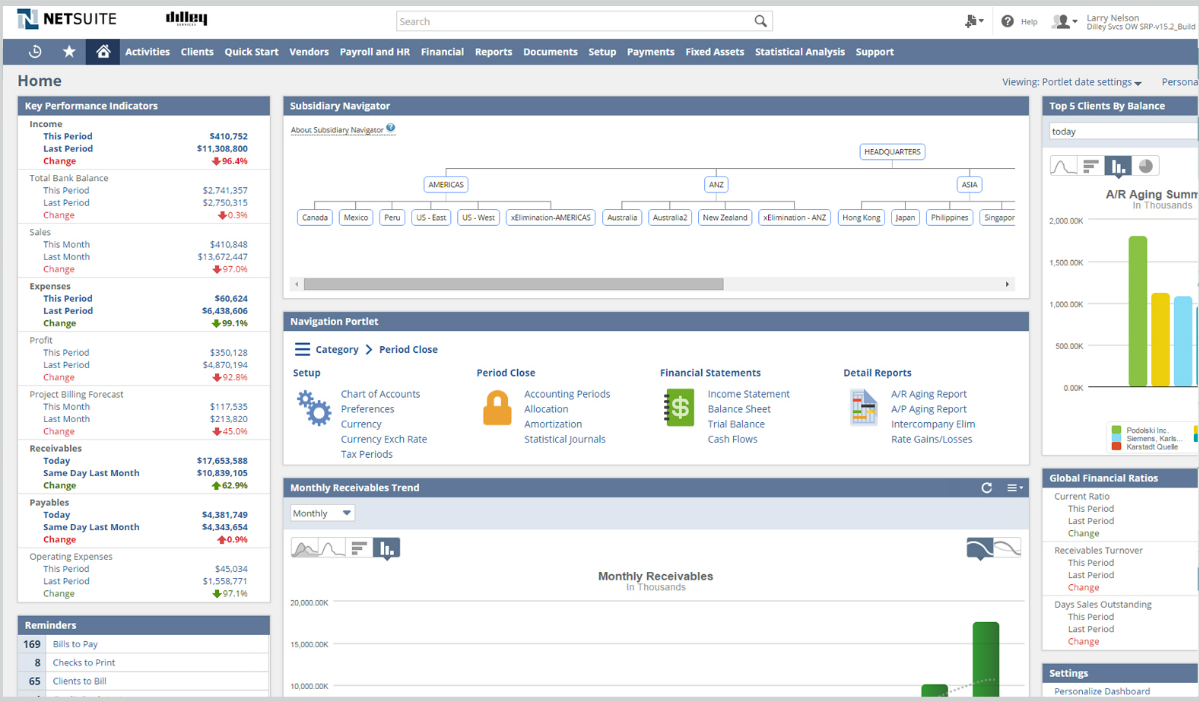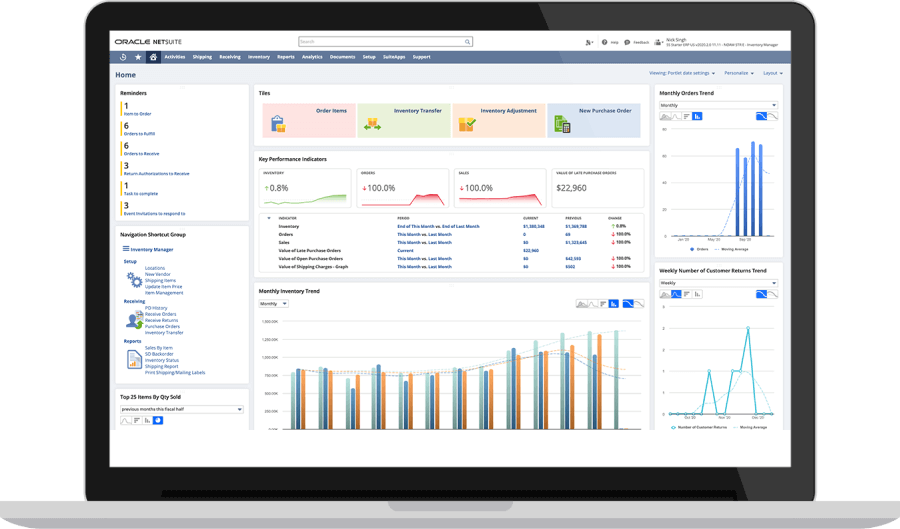NetSuite ERP: Your All-in-One Business Management Solution
Keywords: NetSuite ERP, business management software, cloud ERP, ERP software, NetSuite features, NetSuite benefits, NetSuite implementation, NetSuite pricing, NetSuite alternatives
Are you looking for a way to streamline your business operations and improve efficiency? If so, you might want to consider NetSuite ERP. NetSuite is a cloud-based enterprise resource planning (ERP) system that can help businesses of all sizes manage their finances, operations, and customer relationships. In this article, we’ll explore what NetSuite is, its key features, the benefits it offers, the implementation process, and answer some frequently asked questions.
What is NetSuite ERP?
NetSuite is a comprehensive, cloud-based ERP system that integrates all aspects of your business into a single platform. This means that you can access all of your business data from one central location, making it easier to make informed decisions. Unlike traditional on-premise ERP systems that require significant IT infrastructure, NetSuite is hosted in the cloud, meaning you don’t need to worry about expensive hardware or software maintenance. This accessibility and scalability make it a popular choice for businesses of all sizes, from startups to large enterprises.
Key Features of NetSuite ERP
NetSuite offers a wide range of features designed to help businesses manage their entire operations. Some of its key features include:
-
Financial Management: NetSuite provides comprehensive financial management tools, including general ledger, accounts payable, accounts receivable, and fixed assets management. You can automate financial processes, generate financial reports, and gain real-time visibility into your financial performance. This allows for better budgeting, forecasting, and overall financial control.
-
Supply Chain Management: NetSuite’s supply chain management capabilities help you manage your inventory, track shipments, and optimize your supply chain processes. Features include demand planning, inventory optimization, and warehouse management. This leads to improved efficiency, reduced costs, and enhanced customer satisfaction.
-
Customer Relationship Management (CRM): NetSuite integrates CRM functionality, allowing you to manage your customer interactions, track sales leads, and improve customer service. This unified view of your customers allows for personalized service and increased customer loyalty.

-
Human Capital Management (HCM): For larger organizations, NetSuite’s HCM capabilities support managing your employees, including payroll, benefits administration, and talent management. This streamlines HR processes and improves employee engagement.

E-commerce: NetSuite offers robust e-commerce capabilities, allowing you to create and manage online stores, process orders, and manage customer relationships. This allows for seamless integration of online and offline sales channels.

| Feature | Description | Benefits |
|---|---|---|
| Financial Management | General ledger, accounts payable, accounts receivable, fixed assets management | Improved financial control, automated processes, real-time financial visibility |
| Supply Chain Management | Inventory management, demand planning, warehouse management, order fulfillment | Optimized supply chain, reduced costs, improved customer satisfaction |
| CRM | Customer relationship management, sales force automation, customer service | Improved customer relationships, increased sales, enhanced customer loyalty |
| HCM | Payroll, benefits administration, talent management | Streamlined HR processes, improved employee engagement, reduced administrative burden |
| E-commerce | Online store management, order processing, customer relationship management | Increased sales, expanded reach, improved customer experience |
Benefits of Using NetSuite ERP
Implementing NetSuite ERP offers numerous benefits for businesses:
-
Improved Efficiency: By automating business processes, NetSuite reduces manual tasks and improves overall efficiency. This frees up your team to focus on more strategic initiatives.
-
Reduced Costs: NetSuite’s automation capabilities can significantly reduce operational costs, including labor costs and administrative expenses.
-
Better Decision-Making: NetSuite provides real-time access to your business data, enabling you to make more informed decisions. The comprehensive data analysis tools provide valuable insights.
-
Enhanced Collaboration: NetSuite’s centralized platform promotes better collaboration among different departments within your business.
-
Scalability: NetSuite is a scalable solution that can grow with your business. As your business expands, NetSuite can adapt to your changing needs.
-
Increased Revenue: By improving efficiency, reducing costs, and enhancing customer relationships, NetSuite can contribute to increased revenue.
NetSuite Implementation Process
Implementing NetSuite ERP involves several key steps:
-
Planning and Assessment: This initial phase involves assessing your business needs, defining your goals, and developing a detailed implementation plan.
-
Data Migration: This step involves migrating your existing data into the NetSuite system. Careful planning and execution are crucial for a smooth transition.
-
System Configuration: NetSuite needs to be configured to meet your specific business requirements. This often involves customizing workflows and reports.
-
Training: Your team needs to be trained on how to use NetSuite effectively. Comprehensive training is essential for successful adoption.
-
Go-Live: This is the point when you switch over to using NetSuite as your primary business management system.
-
Post-Implementation Support: Ongoing support is crucial to address any issues and optimize your use of NetSuite.
| Step | Description | Key Considerations |
|---|---|---|
| Planning & Assessment | Assessing business needs, defining goals, developing an implementation plan | Clear objectives, thorough needs analysis, realistic timelines |
| Data Migration | Migrating existing data to NetSuite | Data cleansing, data mapping, validation, minimizing disruption |
| System Configuration | Customizing NetSuite to meet specific business requirements | User roles, workflows, security settings, integrations |
| Training | Training users on how to use NetSuite effectively | Comprehensive training materials, hands-on practice, ongoing support |
| Go-Live | Switching over to using NetSuite as the primary business management system | Thorough testing, contingency plans, phased rollout |
| Post-Implementation Support | Ongoing support and optimization | System monitoring, issue resolution, performance optimization, continuous improvement |
NetSuite Pricing
NetSuite pricing is based on a subscription model. The cost depends on several factors, including the size of your business, the number of users, and the modules you choose. It’s best to contact NetSuite directly for a customized quote.
NetSuite Alternatives
While NetSuite is a leading ERP solution, several alternatives exist, such as SAP Business One, Microsoft Dynamics 365, and Oracle NetSuite. The best choice for you will depend on your specific needs and budget.
Conclusion
NetSuite ERP offers a comprehensive solution for managing your business operations. Its cloud-based platform, wide range of features, and scalability make it a valuable tool for businesses of all sizes. By implementing NetSuite, you can improve efficiency, reduce costs, and make better decisions. However, remember to carefully consider your specific needs and budget before making a decision. Thorough planning and implementation are crucial for a successful outcome.
Frequently Asked Questions (FAQ)
-
Q: Is NetSuite only for large enterprises?
-
A: No, NetSuite offers solutions for businesses of all sizes, from startups to large enterprises. Its scalability allows it to adapt to your growth.
-
Q: How much does NetSuite cost?
-
A: NetSuite pricing is subscription-based and varies depending on factors like business size, number of users, and chosen modules. Contact NetSuite for a customized quote.
-
Q: Is NetSuite difficult to learn?
-
A: NetSuite offers comprehensive training resources to help users learn the system effectively. The user interface is generally intuitive, but some training is always recommended.
-
Q: What are the common challenges in implementing NetSuite?
-
A: Common challenges include data migration, system configuration, user adoption, and integration with existing systems. Careful planning and a strong implementation team can help mitigate these challenges.
-
Q: Can NetSuite integrate with other software?
-
A: Yes, NetSuite integrates with various third-party software applications through APIs and connectors, enhancing its functionality and streamlining workflows.
This detailed article provides a comprehensive overview of NetSuite ERP, covering its key features, benefits, implementation process, pricing, and alternatives. Remember to conduct thorough research and consider your specific business needs before making a decision.
